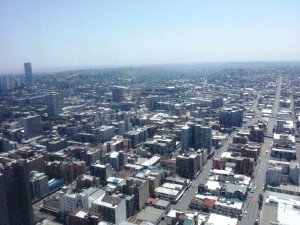Urbanization is on the up. The prospect is that by 2050, 70 percent of the world’s population will live in cities – for Africa, the prediction is 50 percent. The challenge is for cities to offer improved living conditions to their citizens. To this end, the concept of “smart cities” is being developed.
In essence, a smart city is one that relies heavily on IT to enhance quality of life. A report by Deloitte characterizes a city as smart “when investments in human and social capital and traditional (transport) and modern (ICT) communication infrastructure fuel sustainable economic development and a high quality of life, with a wise management of natural resources.” The emphasis in a smart city is on the process of continuous improvement. As such, Deloitte’s report positions South African cities as transitioning cities, undergoing rapid urbanization and population expansion.

My colleagues at IESE Business School Joan-Enric Ricart and Pascual Berrone have developed the Cities in Motion Index. The index is based on the status of cities along a number of key dimensions: governance, public management, urban planning, technology, the environment, international outreach, social cohesion, mobility and transportation, human capital and the economy. The only African cities included in the index are in South Africa. Johannesburg and Cape Town are classified as high potential cities: while their current position falls in the medium to low zone of the index, they present a very fast-paced rate of positive change.
Unfortunately, there was no information about cities in other southern or Sub-Saharan Africa countries. According to Deloitte, with the right choices and the successful adoption of technology, African cities have the opportunity to leapfrog into the mid-21st century. However, technology is but one element of smart cities: as my colleague Prof. Ricart likes to say, “in order to have smarter cities, we need smarter citizens.”
How do you see the prospects of the African cities you know?


What I can add to you is that as suscessful urban sustainable urbanization is key to successful development. Rural populations will continue declining along next years while urban populations will continue growing. Africa is ubanizing rapidly, but still keeps a very important rural population. It si forecasted bu UN that Nigeria will grow extremely fast between this year and 2050 ans it will be one of the countries with highest projected growth in that period. Africa won’t be exempt of aging population effects and like other parts of the world, is undergoing rapid demographic changes. Although the population is largely youthful in Africa, the proportion of older persons has increased tremendously over the past few decades. The growth of the ageing population of Africa is accompanied by an increase in the median age of the population, as well as changes in the dependency ratio, resulting in a decline in the proportion of the population composed of children, and an increase in the population aged 60 year. So sustainable urbanization in all senses will be key, and even pandemias or illneses won’t stop that process and the population aging.
Thank you for your insights, Jose Pedro.
It’s interesting, when I visited Nigeria I heard many people saying “our strength is our population.” It would be a pitty for them lo lose this strength!
I like the comment that smarter cities need smarter citizens and wonder about the meaning of a smart citizen which may encompass other things besides technology. Should smart citizens become more involved in the design and decisions taken in the smart cities? Should they rely less in their governments and politicians and take more control of the future plans of their cities?
Hi Lourdes! I’m of the opinion that whatever can be done by at lower levels shouldn’t be done at higher levels. The more the civil society gets involved, the lesser the need for government/public institutions involvement.
We are thinking in a long term previsions…..but nowadays we have to set up what it is the basis urbanization to continue with the development for a “Smart city”. I have been working in Luanda , mainly, and other african cities since 2007, and it is dificult to follow a strategic urbanization plan when there is not a clear vision and commitment to improve the primary necesities in a city (sewage, pluvials,etc…)
That’s very true, Alvaro. I think the governance structures — and the consequent lack of vision and commitment — are one of the main (if not the main) hindrances to Africa’s urbanization and development overall.